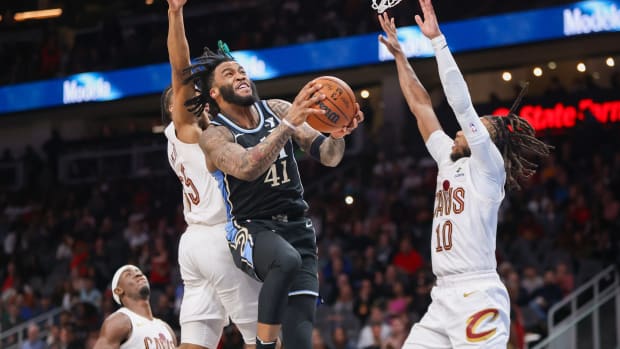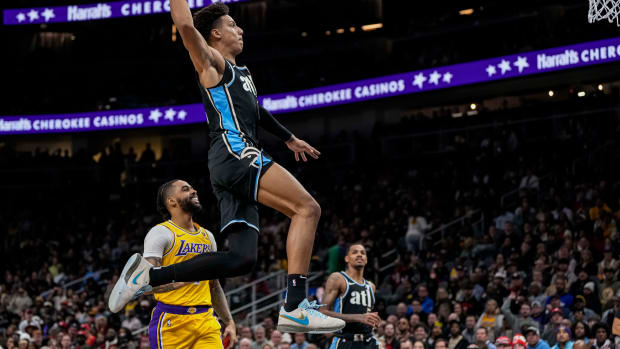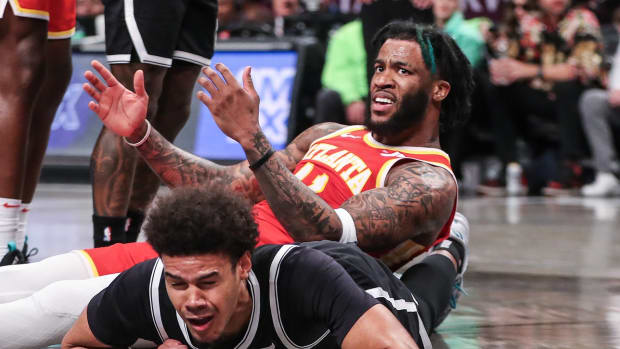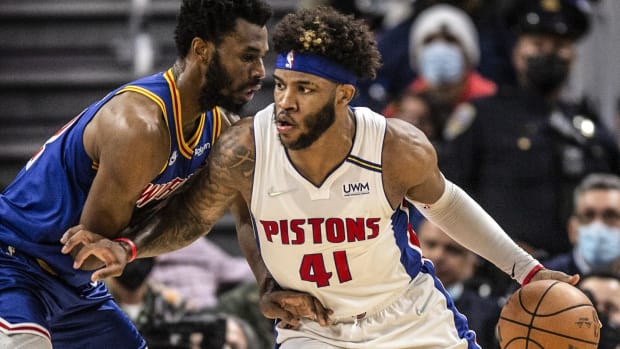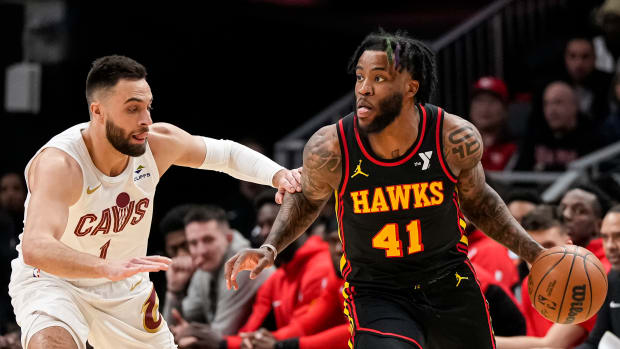Hawks Player Preview: Jabari Parker
Jabari Parker is the kind of player a team takes a flier on when it has nothing to lose. The sixth-year pro is too unproven for a contender to invest in, but intriguing enough for a lesser team to take a chance. That made the Hawks, who had heaps of cap space this summer and no available star to spend it on, a logical destination for the 24-year-old. It’s sobering just to consider the devastating twists and turns that brought Parker to Atlanta in the first place. The forward’s career has been star-crossed since the moment he entered the NBA and so taxing as to obscure the fact that he’s still only 24 years old. Parker tore his ACL just 25 games into his rookie year, then again in 2017 as a misstep cost him 82 games over two seasons. When his hometown Bulls gave him an opportunity after the Bucks let him walk, Parker missed 15 more games and eventually wound up in Washington, who declined his $20 million team option this offseason.
One could argue Parker has never been given much of a chance to succeed, or, conversely, that he has simply never justified the opportunity to begin with. He can undoubtedly still play in the NBA; the question is merely to what end and with what sort of impact. At times he looks as though he were built for the NBA’s shift toward small-ball. With the ball in his hands, Parker can be dynamic, blowing past slower defenders off the dribble and bullying smaller ones near the basket. Occasionally, he’ll combine the two in quick, physical bursts:
Those moments, though, serve more as glimpses of what Parker ought to be than who he really is. He was well below the league average as an isolation scorer last year, per NBA.com, and wasn’t particularly effective as a ball-handler or roll man in the pick and roll. Those marks simply don’t justify a central role, yet Parker creates most of his value with the ball in his hands. That tension complicates his fit on a Hawks team currently building through other means. In theory, Parker should provide Atlanta’s other ball-handlers breathing room; he shot 37 percent from three over his final two years in Milwaukee and occasionally looks the part of a stretch four:
But his percentage plummeted to just 31 percent last season and never eclipsed 26 percent prior to 2017. Even his best three-point shooting seasons came on relatively low volume. It’s just more damaging for an unreliable creator to also offer inconsistent shooting in the modern NBA. Lloyd Pierce could fit him into lineups with Alex Len at center, but how much should a coach really go out of his way to accommodate a player like Parker?
In the preseason, he found ways to fit in despite a wobbly jumpshot. While he shot just 5-of-18 from deep, Parker made 15 of his 22 shots in the restricted area. Well-timed cuts and powerful downhill drives might help him counterbalance an inconsistent jumper, and if he shoots well enough to demand a defense’s respect, those lanes will only widen. He led the team in total rebounds in five preseason games, including two offensive boards per game; while that is partly an indictment of Atlanta’s other bigs’ work on the boards, Parker would provide an important lift on the glass if he sustains that production. He uses his straight-line quickness and vertical athleticism to scurry around defenders and put back misses close to the hoop:
Parker figures to play most of his minutes with other backups, which could allow him to play more with the ball in his hands. The Hawks should use him often as a screener, which would force defenders to pay him mind away from the rim and may help unlock his deceptively explosive downhill game. If he develops a jumper, it only adds a layer for defenses to consider. But rolling to the rim has accounted for a miniscule portion of Parker’s possessions during his career; Atlanta must find a way to activate that part of him.
Injury concerns must be baked into any realistic outlook of Parker’s season, unfortunate though it may be. The Hawks have insurance against another potential setback in De’Andre Hunter and Vince Carter and it’s Parker’s expectation – and should be everyone’s hope – that he’ll stay healthy. But like many elements of his skill set, that aspiration won’t be entirely convincing until it comes to fruition. The same thinking applies to Parker’s defense, which has been largely pitiful throughout his career. The vertical and straight-line athleticism that helps him on offense has never quite translated to the horizontal plane, which inhibits Parker from staying in front of opponents with any modicum of footspeed. He isn’t bulky enough to bang with centers in most normal positional alignments and has openly expressed disinterest over the very notion of defense in the past.
Those issues would be concealable if he were a valuable team defender, but even notes like rotating on time and keeping track of his man away from the ball have been hard to hit. This season will require that Parker take his game to some unfamiliar places – like investing on the defensive end and acquiescing to a lesser role – with the hope that they reroute the trajectory of his career. Though the Hawks have little to lose by helping him along, Parker has all too much to regain.

